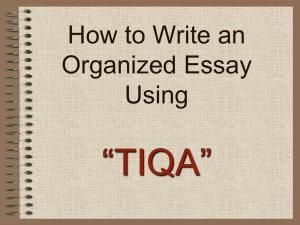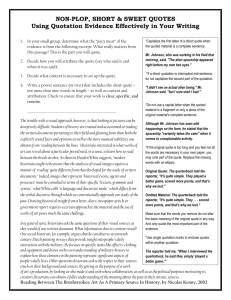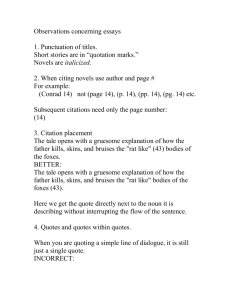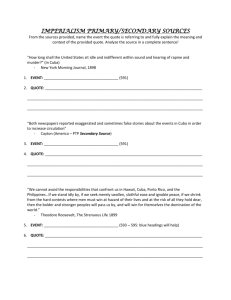Editorial style guidelines: an `A to Z`
advertisement
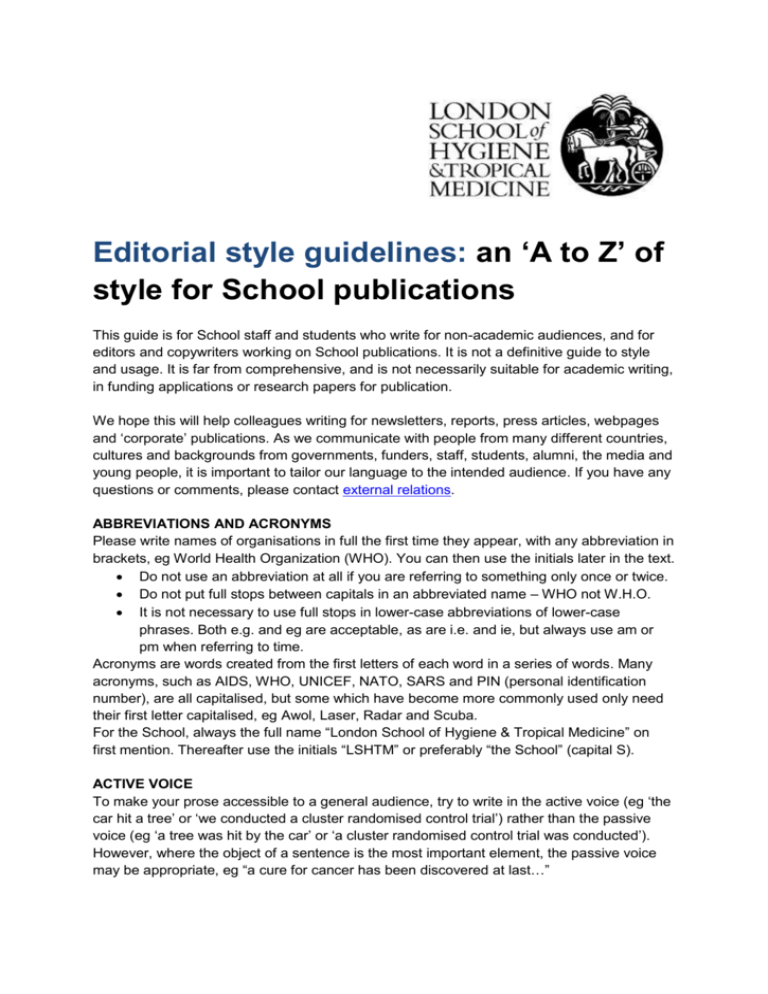
Editorial style guidelines: an ‘A to Z’ of
style for School publications
This guide is for School staff and students who write for non-academic audiences, and for
editors and copywriters working on School publications. It is not a definitive guide to style
and usage. It is far from comprehensive, and is not necessarily suitable for academic writing,
in funding applications or research papers for publication.
We hope this will help colleagues writing for newsletters, reports, press articles, webpages
and ‘corporate’ publications. As we communicate with people from many different countries,
cultures and backgrounds from governments, funders, staff, students, alumni, the media and
young people, it is important to tailor our language to the intended audience. If you have any
questions or comments, please contact external relations.
ABBREVIATIONS AND ACRONYMS
Please write names of organisations in full the first time they appear, with any abbreviation in
brackets, eg World Health Organization (WHO). You can then use the initials later in the text.
Do not use an abbreviation at all if you are referring to something only once or twice.
Do not put full stops between capitals in an abbreviated name – WHO not W.H.O.
It is not necessary to use full stops in lower-case abbreviations of lower-case
phrases. Both e.g. and eg are acceptable, as are i.e. and ie, but always use am or
pm when referring to time.
Acronyms are words created from the first letters of each word in a series of words. Many
acronyms, such as AIDS, WHO, UNICEF, NATO, SARS and PIN (personal identification
number), are all capitalised, but some which have become more commonly used only need
their first letter capitalised, eg Awol, Laser, Radar and Scuba.
For the School, always the full name “London School of Hygiene & Tropical Medicine” on
first mention. Thereafter use the initials “LSHTM” or preferably “the School” (capital S).
ACTIVE VOICE
To make your prose accessible to a general audience, try to write in the active voice (eg ‘the
car hit a tree’ or ‘we conducted a cluster randomised control trial’) rather than the passive
voice (eg ‘a tree was hit by the car’ or ‘a cluster randomised control trial was conducted’).
However, where the object of a sentence is the most important element, the passive voice
may be appropriate, eg “a cure for cancer has been discovered at last…”
ADJECTIVES AND ADVERBS
Please use these sparingly; it is better to let the facts speak for themselves.
ALUMNI
The correct usage is alumnus (male) or alumna (female), however please note that alumnus
may be used for a woman, in the same way ‘actor’ is now preferred to ‘actress’. Use the
plural alumni for a male or mixed group, and alumnae for an all-female group only.
When referring to former students, write the name of the course they studied followed by the
year of graduation in brackets after their name eg Jane Shah (MSc Epidemiology 2012).
Graduation details should be included only if relevant, if the alumna/us has given consent
and/or the information is already in the public domain. (See DEGREE TITLES).
AMERICAN v BRITISH SPELLINGS
We normally use British rather than American English spellings. For example, ‘centre’ not
‘center’, ‘licenced’ not ‘licensed’ and ‘organised labour’ rather than ‘organized labor’.
However, international usage is accepted and please note that proper names of institutions,
such as World Health Organization (not Organisation) and Centers for Disease Control and
Prevention (not Centres), retain that organisation’s preferred spelling. Use -ise in preference
to -ize for verbs (and their derivatives). See –IZE OR ISE? below.
AMPERSANDS
Use an ampersand (&) when writing “London School of Hygiene & Tropical Medicine” and
when it is part of a company or institution’s formal title, (such as the London School of
Hygiene & Tropical Medicine) or in abbreviations such as “R&D” Otherwise, use “and”,
except in informal contexts, eg social media, or in charts and tables where it can save space.
AND
Do not put a comma before “and” in a list of items unless one of the items also includes
“and, eg “She ate soup, a main course and a pudding, but he ate soup, fish and chips, and a
pudding.” In longer, more complex lists separate items with a semi colon (;) and introduce
the list with a colon (:). Eg The items on display included: a copy of the picture previously
owned by his father; the remains of the expedition’s diary; a collection of botanical
specimens; and some photographs taken after their safe return.
APOSTROPHES
Do not use apostrophes after pronouns such as theirs, ours, hers, its.
Use the possessive ‘s after plurals that do not end in ‘s’ eg the children’s room. After
singular words or names that ends in s, the possessive ‘s is optional: James’s room and
James’ room are both correct. Note that simple plurals do not take ‘s; avoid the notorious
‘grocer’s apostrophe eg Onion’s, KPI’s, RCT’s, 1980’s! Decades take an apostrophe to
indicate elision, eg CDs emerged in the ‘80s, but have since been superseded by MP3s.
ATTRIBUTION
When quoting a School member of staff, student or spokesperson, always attribute the
School: eg Alex Song, Professor of XXX at the London School of Hygiene & Tropical
Medicine, said: “Our trial found that YYY...”
BRACKETS
Use curved brackets (...) not square [...] or curly {...}. Place a full stop outside a closing
bracket if the material inside is not a sentence (like this). (But an independent sentence
takes the full stop before the closing bracket.) See also QUOTATIONS below.
BULLET POINTS
Precede bulleted lists with a colon. There is no punctuation after bullet points, eg The School
is organised into three faculties:
•
Epidemiology and Population Health
•
Infectious and Tropical Diseases
•
Public Health and Policy
Avoid using Roman numerals or numbers unless you are listing items in order.
CAPITALS
Avoid over-using capital letters. Use capitals to denote proper nouns referring to people,
organisations and places. Countries, cities, continents and oceans are all capitalised, as are
historic periods. Titles such as Principal, Prime Minister, may take a capital but it is
inappropriate to capitalise professor, research assistant, course director, librarian or lecturer,
unless preceding an individual’s name.
Academic subjects begin with a lower-case letter unless part of a title. Note the government,
civil service, military, etc, are not capitalised, eg “the government announced a new health
policy…” However, we do give “the School” a capital ‘S’ when referring to the London School
of Hygiene & Tropical Medicine.
COLLECTIVE NOUNS
In most cases, use a single verb after a collective noun – eg ‘the government is planning
further reforms to health policy’, ‘the team is growing in 2012/13’ when the collective noun is
working as a unity. Note that ‘data’ are plural, eg “The data show” not “the data shows”.
CURRENCIES
Write numbers associated with currencies as figures, eg US$1, HK$1 (Hong Kong), or spell
out “dollars” and “euros” rather than using the sign. Use US$ rather than just $ to avoid
confusion. Note that it is good practice to give sterling equivalents (in brackets) after quoting
a foreign currency when writing for a UK audience and US$ equivalents when writing for an
international audience.
DASHES AND HYPHENS
Note that there is a difference between the simple hyphen, used to link words (low-income,
high-performance) and the longer dash symbol – when used as punctuation. Do not use
more than one pair of dashes in a sentence.
DATES
The general format for dates is 3 December 2012 – there is no need to use superscript eg
3rd or 10th. When indicating a timespan, use words or dashes eg from 1991 to 1995 or 199195, but for an academic or financial year that spans two calendar years use a slash, eg
Annual Report 2013/14.
DEGREE TITLES
Master’s degrees, in preference to Masters, masters or Masters’ (or Degrees).
Research degrees include MPhil (Master of Philosophy), PhD (Doctor of Philosophy) and
DrPH (Doctorate in Public Health).
Requirements for entry: eg Applicants may have a first-class Bachelor’s degree.
Write ‘distance learning’ (lower case) rather than ‘distance-learning’.
FACULTIES, DEPARTMENTS, RESEARCH CENTRES AND GROUPS
Avoid over-use of faculty, department and centre designations for external publications.
Where used as names, these are capitalised, eg Department of Health Service Research
and Policy, Faculty of Public Health and Policy, Malaria Centre.
FIRST NAMES
Always use first names of people when you first mention them in a text. Our style is to use
the full title and name in the first reference and Dr surname or Professor surname thereafter.
Initials are used for people who prefer them, eg W.H. Auden or J.K. Rowling.
FUNDERS
Please check the websites of funders for the correct style. The School’s funders include:
The Bill & Melinda Gates Foundation
The UK Department for International Development (DfID)
The National Institute for Health Research (UK)
The National Institutes of Health (USA)
The Wellcome Trust
The UK Research Councils listed on http://www.rcuk.ac.uk/
HONOURS
Generally capitalise, eg Academy Award, Nobel Prize, but Nobel laureate.
Use the first name after the first reference to a Sir or Dame, eg Sir Tim Lankester, then Sir
Tim. Use the surname after the first reference to a Lord, Lady or Baron, eg Patricia Scotland,
Baroness Scotland or Lady Scotland, but not Baroness Patricia Scotland.
Note that a person is not ‘awarded’ an order of chivalry, eg a knighthood, but is ‘made’ or
‘becomes’ a member of the order, eg “Claire Bertschinger was made a Dame for services to
Nursing and to International Humanitarian Aid in the 2009 New Year Honours List”.
HOWEVER
If you use “however” at the beginning of a sentence, please use a comma after it.
HYPHENS
Use a hyphen for the following:
• numbers and fractions (eg five-year-old, two-thirds)
• most words that begin with “anti”, “non”, “pro”, “multi”, “semi”, “ex”, “neo” and “vice” – but
not with the prefixes over, under and sub, which form unhyphenated compound
words, eg “Oversubscribed, underweight and substandard”.
• prefixes before a capitalised name, number or date (eg pre-1950, mid-August)
• compass quarters (eg south-west)
• Some titles eg vice-president, director-general, under-secretary, but not deputy director or
general secretary.
HYPHENS (continued)
• In compound nouns and other words to avoid identical letters ie book-keeping, co-operate,
pre-eminent (but bookseller, correspondent and predate).
Note that in British English, compound adjectives are generally hyphenated “a timehonoured custom”, “a two-seater aircraft”, “first-rate piece of work”. Normally, we separate
adjectives with commas ie “a long, cool drink”.
Sometimes a hyphen is necessary to avoid any ambiguity. Compare for example “a littleused car” and “a little used car”.
There is no need to use a hyphen after words ending in –ly ie “a truly great work”, “a quickly
written paper”, but short adverbs such as “much”, ”widely” “little” and “well” may take a
hyphen, eg a well-respected authority, a little-known fact or an ill-conceived plan.
ISE or IZE?
Both can be correct, but we prefer the standard ‘British’ -ise, -isation suffix for consistency.
The spellchecker on many computers defaults to the –ize ‘American’ spelling, so you may
need to do a global search and replace (for –ize, -izing and –ization ) when checking your
final document.
ITALICS
Italicise foreign words that have not passed into regular English usage. It is also correct to
either italicise or underline Linnaean (Latin) names of organisms, and capitalise the generic
name only (eg Homo sapiens, C. Difficile).
Phrases such as avant-garde, bona fide, café, a priori, coup d’etat, in situ, nouveau riche,
post mortem, raison d’etre, status quo, vice versa and vis-a-vis are accepted into the English
language and should not take italics.
Please use italics, rather than quote marks, for the titles of published works including books,
journals, plays, newspapers and films. Eg The Times, The Tempest or The Lancet.
LSHTM
Please avoid using these initials except internally. Use the full name “London School of
Hygiene & Tropical Medicine “or ‘the School’ where possible.
MEASURES
Abbreviate as follows:
kilometre/s km
metre/s m (however be aware of the possible confusion with ‘m’ for million)
centimetre/s cm
millimetre/s mm
kilogram/s kg
pounds lb
Leave a space between figures and denominators eg 3 cm, 24.5 lbs.
NUMBERS
Spell out the word when using the numbers one to nine. Use digits for numbers from 10
upwards. The same principle applies to first to ninth, then 10th upwards.
Use figures for page numbers. Use commas to separate the thousands when writing
numbers higher than 999 – eg 5,345; 180,345.
Use figures for people’s ages over 10, eg she is 24 years old; the 70-and-over age group.
PERCENT %
Use % symbol and figures, eg 75% rather than seventy-five percent or 75 percent. However,
do not use “%age”. Spell it out as “percentage”.
QUOTATIONS
Use a colon (not a comma) to introduce a quote when the quote is an entire sentence, but
not when the quote begins mid-sentence.
He said: “It will never work.”
She replied that it had “always worked before”.
Include punctuation within quotation marks if the quote is an entire sentence.
He said: “LSHTM lecturers are the best in the world” and that his course is “truly awesome”.
QUOTATION MARKS
Use double quotation marks for direct quotes in text, although single quotation marks can be
used for direct quotes in headlines. Use single quotes where a quote is contained within a
quote, eg He said, “It is an example of what Marx called ‘false consciousness’.”
Professor Joe Gonzales, of the London School of Hygiene & Tropical Medicine, said: “These
are important results for those working to improve survival.”
If a quote runs to more than one sentence or paragraph, use an opening double quotation
mark at the start of each paragraph of the quote. Put closing quotation marks only at the end
of the final paragraph.
SPOKESPERSON
When providing a quote or statement which is not attributable to an individual, we use: “a
spokesperson for the School”, not a spokesman or spokeswoman.
STAFF
We generally refer to current staff in the following format: title, name, job title, department
and/or faculty.
STUDENTS
Refer to current students in the following format: Abi Olusegun, MSc Epidemiology.
International students, not overseas students, and use UK/EU students rather than Home
Students. Students are represented within the School by the Student Representative
Council (SRC).
TELEPHONE NUMBERS
Tel: 020 7927 1000 Mobile: 07700 012 345
International telephone style Tel: +44 (0)20 7927 1000
TIME
Write times in the 12-hour format, adding “am” and “pm” immediately after the number, with
a space between the two, eg ‘The event starts at 2 pm’.
Use a full-stop or a colon to separate hours and minutes (eg 2.30 pm or 2:30 pm).
Use the 24-hour clock when stating the embargo time on a press release (eg embargoed to
00:01 Monday 3 December 2012 or Monday December 3 2012).
TITLES
Do not put full stops between initials, after status title (Mr, Mrs, Dr, Prof not Mr., Mrs., Dr.,
Prof.) or between abbreviations (EU, WHO not E.U., W.H.O.).
TONE OF VOICE
We aim to be authoritative, trustworthy, friendly and accessible.
TRADE NAMES
Capitalise trade names and do not use trade names generically, eg Hoover for all vacuum
cleaners, Portakabin for temporary buildings. Note that PowerPoint is a Microsoft product
name, capitalised as shown.
WHO, WHOM
Use ‘who’ when someone is the subject of a sentence, clause or phrase: “the driver, who
was seriously injured, is in hospital”. Use whom when someone is the object of a verb or
preposition: “Ask not for whom the bell tolls, it tolls for thee”.
FURTHER SOURCES
There are many popular guides to style and usage, including in the UK, several published by
media groups, including The Times, BBC News, The Economist and The Guardian. For nonjournalistic style, popular references include: The Cambridge Handbook for Editors, Authors
and Publishers; Fowler's Modern English Usage and Usage and Abusage, by Eric Partridge
In the USA, classic guide is The Elements of Style by William Strunk, Jr. and E. B. White,
commonly known simply as "Strunk and White", and The Chicago Manual of Style is widely
used. Scholarly writing often follows the MLA Style Manual and Guide to Scholarly
Publishing.
WORDS AND EXPRESSIONS THAT FREQUENTLY CAUSE PROBLEMS
AMONG not amongst, similarly while not whilst. (The words ending in “-st” have a use but it
is generally for poetic effect.
ANYONE / ANY ONE ETC
Any one refers to a number, anyone to anybody; same with everyone / every one.
Any way refers to any manner, anyway means nevertheless.
Sometime means at some point, while some time means former.
AVOID POTENTIALLY DISCRIMINATORY WORDS AND PHRASES
These include Third World, peasant, kid / kids (use child, children).
Avoid using the generic term “the disabled”; instead use the term “disabled people”.
Avoid phrases such as “crippled by”, “suffering from” and use “person who has...” or
“people with...”
Avoid sexist language wherever possible. Using plurals ie “the researchers” and later
“they” often gets around the problem of using “he” or “she”.
Avoid racial epithets and the word race applied to populations – use ethnicity
DIGITAL COMMUNICATION
Audiovisual rather than audio-visual
Email rather than e-mail
Multimedia rather than multi-media or multi media
Programme rather than program, except in a software context
Smartphone rather than smart-phone
Website rather than web site or web-site
URLs – do not include the prefix http://... in printed materials
FEWER, LESS - use FEWER for numbers, LESS for quantity.
GENDER TERMS
Do not refer to a woman as a girl. Regard 18 as the age at which girlhood (and boyhood)
ends. Avoid the word lady; woman is better.
ONTO/INTO
Note the difference between: “She put the paper onto the table” (preposition) and “She went
on to the next slide in her presentation”, or “He walked on to the pub across the road”.



